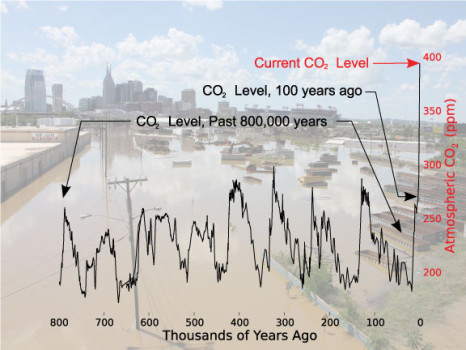You flip off any extra lights in your house before going out, and several thousand miles away, a record-setting heat wave does not suffocate a city under a blanket of smoke and smog.
You start up your hybrid’s engine, and a series of floods, ranging from the worst in memory, to the worst in history, do not occur.
You dutifully toss your cans and bottles into the recycling bin, and around the globe, it suddenly isn’t the second-hottest year on record, after the hottest decade in recorded history.
Except that isn’t what happens, is it?
For all of your efforts, and the efforts every person who has ever attempted to “go green,” there is still global climate change. The earth is still warming at an alarming rate, and greenhouse gases are still being pumped into the atmosphere without a second thought. Disasters are still tearing at the seams of the planet, and we are still doing nothing.
Carbon dioxide (CO2) is considered to be the most prevalent greenhouse gas on the warming earth, and it has been thought that the highest “safe” level of this chemical is 350 parts per million (ppm). With that in mind, the current level is around 393 ppm, and the level hasn’t been 350 ppm since 1985, according to measurements taken by the National Oceanic and Atmospheric Administration.
The global carbon dioxide level has been in the “danger zone” for a quarter of a century.
The modern environmental movement has existed since the 1960s, but the campaign to “go green” didn’t ramp up until the 2000s. By that point, humanity had already hurtled 30-40 ppm over its limit. Meanwhile, as countless Americans “went green,” global carbon dioxide emissions marched ever upwards. If the growth rate of 2 ppm/year continues, the planet will reach 400 ppm by about 2014.
50 ppm may seem like an insignificant amount, but consider that, for the last 800 millennia, global levels of CO2 have ranged from about 200 to approximately 300 ppm, based on samples taken from ice cores, which are considered accurate records of the makeup of the atmosphere. At no time in the past 800,000 years have CO2 levels ever risen above 350; they never even came close.
Yet in the last century or so, there has been an increase of over 100 ppm; a change so unprecedented that there is no historical context whatsoever. In a sense, humanity is moving into completely uncharted territory.
It’s almost laughable to believe that today’s personal-level environmentalism will have some effect in slowing climate change, let alone stopping it; that any single person recycling, switching out incandescent light bulbs for compact fluorescent ones, or eating organic foods, will save the planet.
Certainly, these actions can have profound personal or local effects, but they are meaningless in terms of the entire world.
If there was a person who emitted no carbon whatsoever (known as having no ‘carbon footprint’), they would still be one out of seven billion (1/7,000,000,000). Even if all three hundred million Americans left a carbon footprint of zero, there are still over a billion people each in India and China with carbon footprints of their own. Toss in the two or three other billion people on the planet who emit more than a negligible amount of CO2 and you have four to five billion people offsetting the efforts of the US.
Except that the US is still emitting 1000 tons of carbon every 5.3 seconds, according to a 2006 UN report, an increase from four years prior. Nothing has changed. The green movement has not even dented climate change.
We are all responsible for altering the climate, and we must therefore all be held accountable. This will not happen, however, unless everyone is required to contribute to efforts to fight the rising tide of CO2. That means not only everyone in the United States, but everyone in the entire world.
For humanity to have a real and lasting positive impact, it will take nothing short of an unprecedented global shift in a relatively short amount of time to a zero emissions society. Even then, even if humanity emits no carbon, then there’s no guarantee that the CO2 level will drop. Nothing short of that will be adequate.
Even now, it may already be too late.
Personal environmental efforts do have profound effects; biking instead of driving can improve fitness and reduce gas costs, changing out incandescent lights for more efficient fluorescents helps to save on electricity costs, and driving a hybrid can result in a quieter, better-smelling ride.
Nonetheless, it’s downright silly to think that any of these efforts alone will save the planet.
Global climate change is an issue that’s bigger than any of us, and is therefore a problem that must be solved by all of us. Doing anything less than everything that we can will not be enough.








Sari • Oct 19, 2010 at 12:52 pm
Yea, but, the only way we can all lower carbon admission is if we ALL start to lower them personally. yea maybe eating organic and local wont change the weather patterns, or affect CO2 admission, but its still a whole hell of a lot better then traditional big ag. or driving a hummer, or, or, or. the world wont change, yea, but that doesn’t mean WE can’t. However, great use of the facts, i agree that we need to come together as HUMANS to make things better.
Ed • Oct 7, 2010 at 11:00 pm
Great job! about time we got rid of the liberal bias about climate change in the southerner! I’m glad people are informed about the facts in this article, instead of political views on how global warming will kill us all GLOBAL WARMING!!!!!!
haha, We need more writers like you
Kevin • Oct 8, 2010 at 7:45 am
There is a Liberal Bias in the Southerner period.
Ed • Oct 17, 2010 at 11:55 pm
Haha true that!
Sari • Oct 19, 2010 at 12:53 pm
um, yea…. maybe not us. but it will affect our food supply, our drinking water, our climate. and yes maybe global warming is a stupid term, that doesn’t change the facts. so please, don’t make this into something thats political when its something that’s HUMAN!